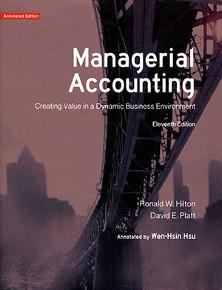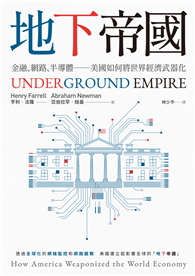| FindBook |
有 1 項符合
Managerial Accounting(Annotated Edition)(11版)的圖書 |
 |
Managerial Accounting(Annotated Edition) 作者:Ronald W. Hilton、David E. Platt 出版社:華泰文化 出版日期:2017-04-01 語言:繁體/中文 |
| 圖書選購 |
| 型式 | 價格 | 供應商 | 所屬目錄 | $ 1278 |
高等教育 |
|---|
| 圖書館借閱 |
| 國家圖書館 | 全國圖書書目資訊網 | 國立公共資訊圖書館 | 電子書服務平台 | MetaCat 跨館整合查詢 |
| 臺北市立圖書館 | 新北市立圖書館 | 基隆市公共圖書館 | 桃園市立圖書館 | 新竹縣公共圖書館 |
| 苗栗縣立圖書館 | 臺中市立圖書館 | 彰化縣公共圖書館 | 南投縣文化局 | 雲林縣公共圖書館 |
| 嘉義縣圖書館 | 臺南市立圖書館 | 高雄市立圖書館 | 屏東縣公共圖書館 | 宜蘭縣公共圖書館 |
| 花蓮縣文化局 | 臺東縣文化處 |
|
|
圖書介紹 - 資料來源:博客來 評分:
圖書名稱:Managerial Accounting(Annotated Edition)(11版)
內容簡介
The goal of Managerial Accounting is to acquaint students of business with the fundamental tools of managerial decision making and to provide a context for understanding and reacting to the dramatic ways in which business is changing. The emphasis throughout the text is on using accounting information to help manage an organization, while explaining concepts in a way that students can relate to. They should not only be able to produce accounting information, but also understand how managers are likely to use and react to the information in a range of businesses.
目錄
Ch 1 The Changing Role of Managerial Accounting in a Dynamic Business Environment
Ch 2 Basic Cost Management Concepts
Ch 3 Product Costing and Cost Accumulation in a Batch Production Environment
Ch 4 Process Costing and Hybrid Product-Costing Systems
Ch 5 Activity-Based Costing and Management
Ch 6 Activity Analysis, Cost Behavior, and Cost Estimation
Ch 7 Cost-Volume-Profit Analysis
Ch 8 Variable Costing and the Costs of Quality and Sustainability
Ch 9 Financial Planning and Analysis: The Master Budget
Ch10 Standard Costing and Analysis of Direct Costs
Ch11 Flexible Budgeting and Analysis of Overhead Costs
Ch12 Responsibility Accounting, Operational Performance Measures, and the Balanced Scorecard
Ch13 Investment Centers and Transfer Pricing
Ch14 Decision Making: Relevant Costs and Benefits
Ch15 Target Costing and Cost Analysis for Pricing Decisions
Ch16 Capital Expenditure Decisions
Ch17 Allocation of Support Activity Costs and Joint Costs
APPENDIX I: The Sarbanes-Oxley Act, Internal Controls, and Management Accounting
APPENDIX II: Compound Interest and the Concept of Present Value
APPENDIX III: Inventory Management
Ch 2 Basic Cost Management Concepts
Ch 3 Product Costing and Cost Accumulation in a Batch Production Environment
Ch 4 Process Costing and Hybrid Product-Costing Systems
Ch 5 Activity-Based Costing and Management
Ch 6 Activity Analysis, Cost Behavior, and Cost Estimation
Ch 7 Cost-Volume-Profit Analysis
Ch 8 Variable Costing and the Costs of Quality and Sustainability
Ch 9 Financial Planning and Analysis: The Master Budget
Ch10 Standard Costing and Analysis of Direct Costs
Ch11 Flexible Budgeting and Analysis of Overhead Costs
Ch12 Responsibility Accounting, Operational Performance Measures, and the Balanced Scorecard
Ch13 Investment Centers and Transfer Pricing
Ch14 Decision Making: Relevant Costs and Benefits
Ch15 Target Costing and Cost Analysis for Pricing Decisions
Ch16 Capital Expenditure Decisions
Ch17 Allocation of Support Activity Costs and Joint Costs
APPENDIX I: The Sarbanes-Oxley Act, Internal Controls, and Management Accounting
APPENDIX II: Compound Interest and the Concept of Present Value
APPENDIX III: Inventory Management
|











